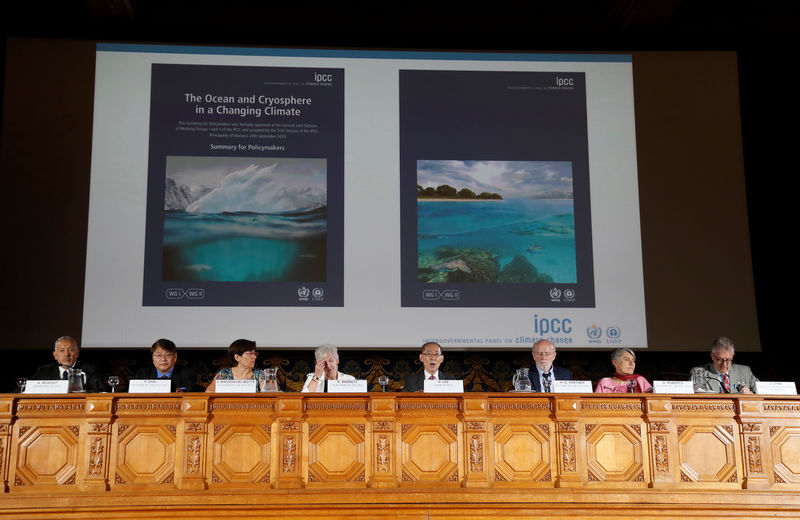By Matthew Green
NEW YORK (Reuters) - Scientists behind a landmark study of the links between oceans, glaciers, ice caps and the climate delivered a stark warning to the world on Wednesday: slash emissions or watch cities vanish under rising seas, rivers run dry and marine life collapse.
Days after millions of young people demanded an end to the fossil-fuel era in protests around the globe, a new report by a U.N.-backed panel of experts found that radical action may yet avert some of the worst possible outcomes of global warming.
But the study was clear that allowing carbon emissions to continue rising would upset the balance of the geophysical systems governing oceans and the frozen regions of the Earth so profoundly that nobody would escape untouched.
"We are in a race between two factors, one is the capacity of humans and ecosystems to adapt, the other is the speed of impact of climate change. This report...indicates we may be losing in this race. We need to take immediate and drastic action to cut emissions right now," IPCC Chair Hoesung Lee said at the presentation of the report in Monaco.
Finalised on Tuesday in a marathon 27-hour session of talks in Monaco between authors and representatives of governments, the report was the culmination of two years' efforts by the U.N.-backed Intergovernmental Panel on Climate Change (IPCC).
Compiled by more than 100 authors who crunched 7,000 academic papers, the study documents the implications of warming oceans, fast-melting ice sheets in Greenland and Antarctica and shrinking glaciers for more than 1.3 billion people living in low-lying or high-mountain regions.
The report projects that sea levels could rise by one meter (3.3 feet) by 2100 -- ten times the rate in the 20th century -- if emissions keep climbing. The rise could exceed five meters by 2300.
In the Himalayas, glaciers feeding ten rivers, including the Ganges and Yangtze, could shrink dramatically if emissions do not fall, hitting water supplies across a swathe of Asia.
Thawing permafrost in places like Alaska and Siberia could release vast quantities of greenhouse gases, potentially unleashing feedback loops driving faster warming.
The IPCC galvanized global concern over climate change in October when it published a report that showed the world would need to halve emissions over the next decade to stand a chance of meeting the temperature goals in the 2015 Paris Agreement.
Following a subsequent report published last month on land use and farming, the IPCC Special Report on the Oceans and Cryosphere -- or 'frozen world' -- was the final piece in a scientific jigsaw revealing the global sweep of climate impacts.
Released two days after a one-day U.N. climate summit in New York closed with scant signs of transformative action by major economies, the latest report underscored the gulf between warnings from science and the policies of most governments.
In Monaco, IPCC members avoided criticizing policy makers.
"The IPCC does not judge the action of world leaders but the fact that this report was called for ... is an indication of the extent to which science is becoming central to choosing pathways to a more sustainable future," IPCC co-chair Debra Roberts said.
TRIPLE BLOW
Carbon emissions, which hit a record high last year, are projected to inflict a devastating toll on oceans, which have so far buffered almost all man-made warming generated by burning coal, oil and gas.
As the oceans get hotter, so-called "marine heatwaves" are becoming more intense, turning coral reefs boneyard white -- including much of Australia's Great Barrier Reef.
IPCC co-chair Hans-Otto Portner said coral reefs may be among those biological systems which have already passed beyond the tipping point of irreversible change.
As more carbon dioxide dissolves in the water, the oceans are also becoming more acidic, damaging ecosystems.
The rising temperatures are also starving the upper layers of the water of oxygen, suffocating marine life, creating growing dead zones, and disrupting the circulation of ocean currents, which then unleashes more disruptive weather on land.
The authors say that long lag times at work in oceans mean some of these changes will intensify over centuries -- even if the world stopped emitting all its greenhouses gases tomorrow.
But if emissions are allowed to continue rising then the impacts are likely to start accelerating so rapidly that they will overwhelm societies' capacity to cope, with the poorest and most vulnerable communities and countries succumbing first.

"In a high emissions scenario, the chances of having any reasonable foothold to deal with the impacts becomes much smaller," said Matthias Garschagen, chair in human geography at LMU Munich and one of the report's authors.